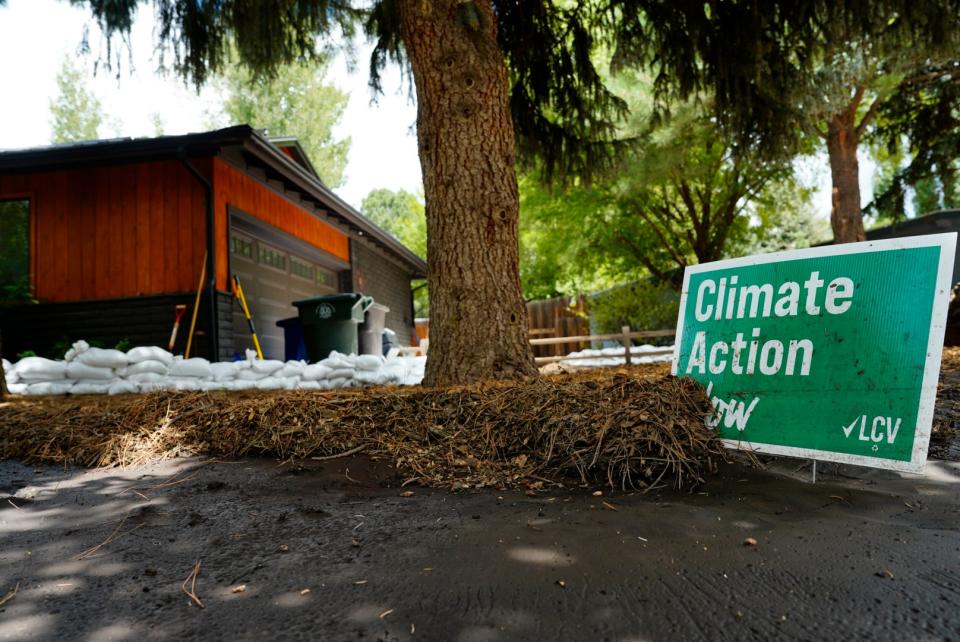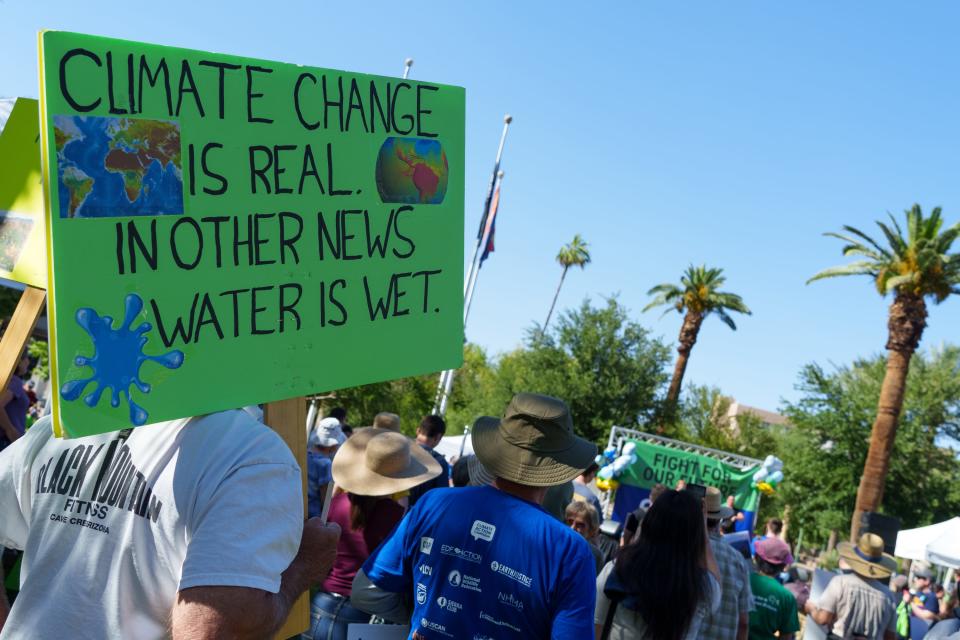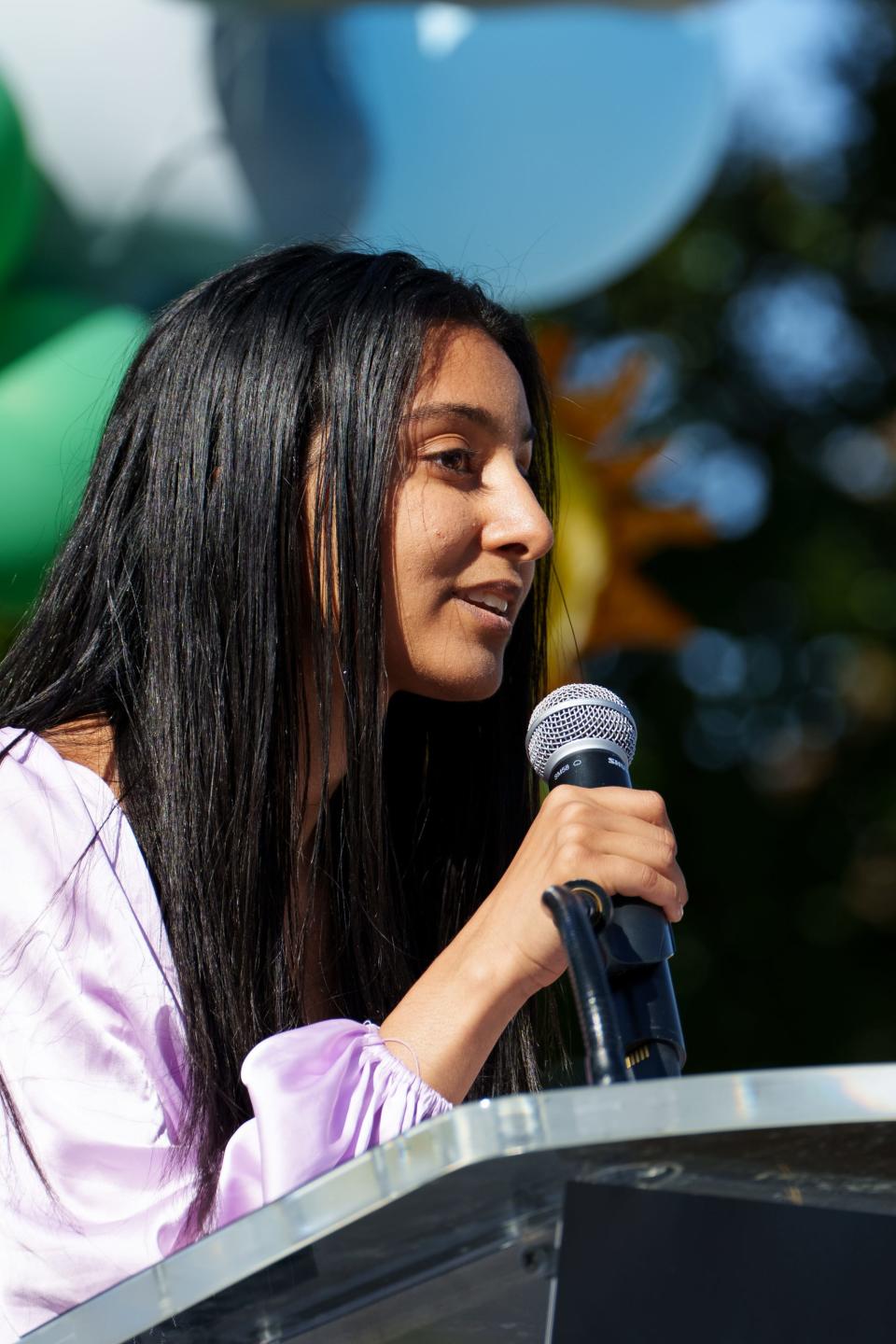The climate crisis stresses me out, too. But I'll read the hate mail and call it hope
For the past 26 weeks — half a year — I have published a story every Wednesday about how climate change is altering life in Arizona and the Southwest. I'm proud of our work in this space and of The Arizona Republic for creating this position in 2022 to address the global warming crisis in America's hottest big city.
Our goal has been to use storytelling, data, expert input and local context to help people understand how climate change has and will affect life as we know it, via regular weekly installments appearing on the back of the front page and online each week.
Some readers are grateful for this coverage. But my email inbox indicates that others are feeling the emotional strain this type of news can trigger.
Call it hate mail. Call it reader feedback. Some weeks, the only label I can think to give the emails I receive in response to evidence-based reports on the impacts of warming average temperatures is: therapy.

Only, I'm not paid to be a therapist. I wasn't hired to be your punching bag. Having a public voice and platform comes with a certain expectation of criticism. But this feels like something more.
Every Wednesday, my story publishes at around 6 a.m. Around 7 a.m., I wake up, skim it again for errors and share it on social media. Then I make myself a pot of coffee or tea, take a deep breath and open my inbox.
Visit the series beginning: Phoenix isn't what it once was because of climate change. But it's not too late to save it
I typically find about a half dozen reactions to my latest story. Usually one or two are thanking me for the coverage or asking follow-up questions. Often a couple can be described as diatribes from citizens who want to share their perspective. And there are generally a few emails telling me I'm a brainwashed moron, a scientific fraud or worse.
In the past six months, reader emails responding to a story of mine have included:
Accusations:
"Your fake science has probably been very lucrative for you too. BTW, skewing data doesn't make you a scientist, it only makes you a fraud. ... you are not interested in the truth because it would affect your grants and credibility."
"Why don’t you have some self respect and write the facts/truth?"
"People fought in wars and died so u could be a liberal moron."
Dismissal:
"Good Morning, I say it is already too late to stop climate change."
"All of the gibberish about about global warming is subject to question."
"You are buying into the scam. It’s called weather."
Mockery:
“Oh oh, heat wave coming. Its [sic] all global warming. We’re all going to die. Save us Joan!!!!!! LOL”
"I find it grand that Joan Meiners is a 'storytelling' and 'climate news' reporter. Ummmm, same thing!"
“You liberals and your climate change crap cracks us up. Morons, all of you.”
Repeating debunked climate misinformation:
"There are a multitude of authors of climate theory that do not believe that CO2 materially affects the climate because CO2 in the atmosphere is so small. In addition, you and I need CO2 to live and to grow food to live on."
"Along with NOAA playing with reported temperatures to fit their narrative , it is impossible to estimate what the effect of CO2 is in Pheonix. [sic]"
"I apologize for the long email. Be careful, if you read all of it, you might learn something that the 'woke' media won't cover because they are dismissive of any SCIENTIFIC opposing opinion." (The email was very, very long.)
Personal attacks:
"I can’t stop laughing. SAVE THE PLANET. You’re probably for defund the police, open borders, war in Ukraine. I can only thing [sic] mom and dad are liberal morons to. [sic]"
"Where do you live now? NY? You are out of touch." (I live in Phoenix.)
"Maybe you also believe in spells, charms, crystals and potions too."
Vague racism/sexism:
"An open border policy is at cross purposes with a climate fight."
"You failed to mention the effects of the 800-lb gorilla in the room: overpopulation."
"Well, Joan, serious Female Hanging in an Alleppo Pine Tree." (In response to this story that featured photos of me as a tree-climbing child in Phoenix.)
This is not an experience unique to me. Many reporters covering all sorts of topics get hate mail. But it seems to particularly plague climate reporters. And it likely signifies something bigger than all of us, maybe even something hopeful.
To get more insight into why and where and how this occurs, I checked in with a few other climate reporters around the country.
Hateful email knows no bounds
When Daniel Rothberg, environment reporter for The Nevada Independent, gets negative email responses to his coverage of the Western megadrought or other climate-related issues, he tries to channel his brother's voice telling him it's just because his reporting is important and unsettling.
“It is such a weird thing. And we're not the only industry that deals with this," Rothberg said. "But as journalists, we’re encouraged to share all this information about ourselves and then we have people come back at us and tell us we should be banished or we're terrible at our job."
While having to sift through misinformed climate denial and personal attacks frustrates him, Rothberg thinks that, as a white man, his inbox likely contains less vitriol than that of his female or minority counterparts.
Storm chasing: Forecasting the monsoon is complicated. Climate change made it a whole other game
This trend has been studied. In May, communications researchers at George Washington University published a story in Undark Magazine summarizing their in-depth interviews with science journalists about harassment from readers. (Disclaimer: I was one of 10 journalists interviewed.) They concluded that women do "bear the brunt of these attacks," and that it can eventually lead to burnout and the loss of talented journalists from an important communications space.

Deb Krol, Indigenous affairs reporter for The Arizona Republic and an enrolled member of the Xolon (also known as Jolon) Salinan Tribe from the Central California coastal ranges, thinks this pattern can be traced back to white settlers introducing a patriarchal culture that permits, condones even, the dismissal and critique of women's voices. But she hasn't let it scare her away from reporting on issues that matter.
"I come from a matriarchal tribe where women are in charge," Krol said. "So when they think they're going to, you know, (unload) on me because I'm just a poor girl, either I ignore them entirely or I send them a politely phrased email rebutting what they say and pointing out some facts. As a Native woman, I don't take it."
How to talk about climate denial: He got booted for discussing climate change. But he's undeterred, with science on his side
Halle Parker, a woman of color who covers the environment for the New Orleans radio station WWNO, received more racist hate mail when she was a general assignment reporter for a print newspaper in Virginia than she does now. It could be because the radio medium doesn't inspire email responses as easily, she said, or it could have more to do with culture differences between Richmond and New Orleans. It's hard to tell.
“I think the anger really stems from the subject matter itself and then maybe some people will take it a step farther and say 'You’re just writing this because you’re Black,'" Parker said. "I think sometimes what people chose to write about in these emails shines a light on what people think or don’t think they need to be told about. In a bad way.”
In Palm Springs, Janet Wilson, an environment reporter for The Desert Sun with three decades of experience receiving reader feedback, thinks the relationship between subscribers and local journalists does differ depending on the newspaper's location and size.
"Having worked at national publications and smaller publications, readers genuinely care about and interact with reporters and editors in a different way at smaller papers," Wilson said. "It might be politics. It might be that people are really waking up to the new reality that we’re living in and are going to be facing for the rest of our lives."
Cooling center controversy: Amid heat waves, a study questions cooling centers. A Phoenix official says we need more
Also reporting from California, Los Angeles Times energy and environment reporter Sammy Roth wrote in February about how facing this new reality is also stressful for the journalists reporting on it day in and day out. He concluded that, despite the pushback, "none of us is going to look back in 20 years and wonder if our climate stories were a little too radical."
His point was that, while climate reporters get accused of being activists and supporting a political agenda, the truth is that when we do our jobs to research the most pressing issues of concern to our readers and query data and credible experts about causes and solutions, they tell us, time and again, that the main obstacle putting us all in danger is the resistance (often political) to moving away from fossil fuels.

We would be bad journalists if we didn't report this political context, which is not the same as crossing into advocacy. But just as reporters in different situations get different flavors of hate mail, the way climate reporters can get away with explaining the same global phenomenon to different audiences and still get any traction depends somewhat on meeting local readers where they are. In our politically-divisive modern reality, local journalists have a vital role to play in getting people on board with what needs to be done to address climate change.
Learn about the first climate science: The power of the sun, of the people and of politics. The climate depends on all 3
It's just that, apparently, the job comes with hate mail.
Another conclusion from the George Washington University researchers was that, for the sustainability of science journalism, newsrooms need to adopt more leadership in helping reporters field negative feedback.
“We are putting ourselves out there. I think it’s the least that journalism managers can do to have a process for reporting (abuse) and have managers say it’s ok to not respond or to block people," Rothberg agreed (not speaking specifically about his own newsroom).
But also, maybe the hate mail serves its own purpose for readers and is all a part of educating people about the distressing realities of climate change. Maybe, regardless of how or if we respond, it's doing some good.
"I often think about ‘What did you gain from writing this email. Was it cathartic for you?,'" Parker observed.
Who is hate mail for? Who is it from?
When psychologists talk about the root causes of climate denial, they often reference the cognitive strain of stressful news and how it is "more effortful to wrap our heads around a complex situation with multiple perspectives than to settle for a simple answer." Industry-backed climate misinformation campaigns have seized on this loophole of human nature.
More: Climate change is not your fault, but that doesn't mean you're off the hook
In my inbox, the most long-winded readers often start their emails by telling me how old they are and how long they have lived in Arizona. John is "80 years old and an Arizona native." Mickey "came here in 1969, at age 19."
"By way of background," Chris wrote, "I am 77, upright, cognitive and follow current events daily." Roger told me that "30 years on this planet, does NOT make you an expert," before explaining to me what he knows from his longer residency.
Climate change seems to be a young person's issue, according to some readers, local youth activists and a story published this week in USA TODAY.
When I spoke with Phoenix climate activist and recent ASU graduate Saiarchana Darira last week, she expressed frustration at the older generations who have been in charge of the world all her life dismissing concerns from the generations that will have to weather its future.

“Older people tend to think that young people aren’t as competent, but I think in a way, for young people, the stakes are so much higher," said Darira, whose Twitter handle is @tolovehumanity. “It’s an existential crisis to the point where people are thinking about whether they even want to bring kids into this world. There’s a difference in how we perceive the intensity of this crisis."
If there's a lag in how generations are coming to terms with the intensity of the climate crisis, maybe it manifests most in the contents of environment reporters' inboxes.
Climate anxiety, a term that has gained popularity quickly over the past decade, is likely experienced differently by "Zoomers" than by those who still send hand-written op-ed solicitations to newsrooms. The term has also been described as "really just code for white people wishing to hold onto their way of life or to get 'back to normal.'"
In light of the fact that poor and minority communities often experience the worst climate impacts despite contributing least to the problem, the same author asks: "How can we make sure that climate anxiety is harnessed for climate justice?"
More: Climate report draws an arc toward environmental justice, seeking equitable emissions cuts
None of us are getting back to the normal remembered by many of the hate mailers. It's a different world now, and we're all going to have to face the emotions of it in our own ways while navigating solutions to it together.
If climate-inspired hate mail serves a cathartic purpose, fine, we can take it. (Threats, racism, sexism, ageism, ableism and the like are never OK.) But it should not obstruct progress or overshadow facts.
Here for it
My formative experience with hate mail happened three weeks into my very first journalism gig. I wrote about the extensively-documented, devastating impact urban feral cats have on biodiversity and human health because I thought people in my city would want to know.
As soon as the story published, on the July 4 front page, comments flooded in by the hundreds from readers calling me hateful, murderous, ugly and threatening to "convene a panel of experts" to discredit me (they didn't). My editor and editor-in-chief fielded phone calls all day from readers demanding I be fired.
It shook me. But more seasoned journalists in the newsroom congratulated me on writing something that hit a nerve. Atlantic writer Katherine Wu used my experience to pen a guide for other journalists on "How to Deal with Negative Reactions to Stories."
I learned to see it as part of the job, and that experience thickened my skin. It also left me with an enduring fascination about why people send hate mail.
I am not at all a brainwashed moron or a scientific fraud. But I am interested in why readers seem to think it's ok to email to tell me that. I view this question as part of my beat and part of what we need to understand about the culture around climate communications in order to move the needle toward solutions.
More: Can an 'army of moms' slow climate change to spare their children a fossil fuel future?
I'm sure this story will trigger responses. So, while I welcome feedback and being a part of your climate acceptance process, I'll conclude with a friendly reminder that repeated, personal email harassment is a Class 1 misdemeanor in Arizona.
Therapists are an option, as are actual punching bags. As you continue reading, I hope you find healthy ways to grapple with our distressing, shared reality and become a part of our best possible future.
Joan Meiners is the Climate News and Storytelling Reporter at The Arizona Republic and azcentral. Before becoming a journalist, she completed a doctorate in Ecology. Follow Joan on Twitter at @beecycles or email her at joan.meiners@arizonarepublic.com.
Please support climate coverage and local journalism by subscribing to azcentral.com at this link.
This article originally appeared on Arizona Republic: Climate reporters navigate truth, stress, hate mail and hope

